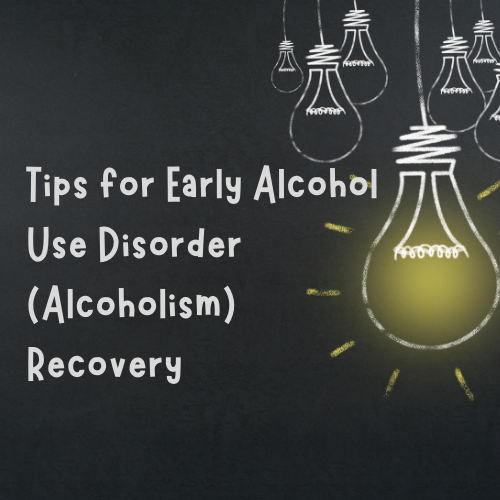
Tips for Early Alcohol Use Disorder (Alcoholism) Recovery
What tips do you need in early alcohol use disorder (alcoholism) recovery?
It’s important in early alcohol use disorder (alcoholism) recovery to have tools and a plan to prevent relapse.
Relapse prevention describes skills and habits to continue healthy behaviors and avoid falling into old patterns of negative behavior. Additionally, it is vital for any substance use treatment program because without it, relapse is almost inevitable. But once you understand relapse, you will be able to much more effectively control the thoughts and behaviors that lead to it.
How does relapse happen?
Outlined below is one model of how it can occur. If you have just gone through a substance use treatment program, it can help to think about your own behaviors as you read through the steps. If you can recognize the stages of relapse as they are happening, you will be much better prepared to deal with them and take action to prevent relapse which is very important in early alcohol use recovery.
Stages of relapse to recognize in early alcohol use recovery
The trigger
Something happens that provides impetus for the whole process. It could be anything; good or bad, internal or external, mental or physical. A stressful day at work, running into an old friend who uses, or achieving a goal and feeling proud of yourself could all be triggering events.
You interpret it. The trigger itself doesn’t begin the relapse, but it causes a change in your mental state. Usually it takes the form of a statement of what you believe about yourself. This statement varies from person to person and situation to situation, but examples could include saying to yourself, “I’m a total failure,” “I’m not good enough to succeed,” or “I deserve to celebrate.”
Cravings
Your interpretation of the triggering event leads to cravings, the physical and psychological desire to engage in your old, harmful behaviors. This can be any behavior you’re trying to avoid, such as having a drink or going gambling.
You have permission-giving thoughts. Your craving can then lead to thoughts where you give yourself permission to engage in the old behavior. These thoughts can take many different forms. Here are a few examples: “I had a rough day at work. I need a cigarette.” “I haven’t had a drink in a month. I’ll be fine just going to that party.”
Action
At this point in the process you take the steps necessary to engage in the old pattern, or give yourself an excuse for not engaging in your new pattern. Examples could be calling your old dealer, stocking up on beer for the weekend, “dropping in” on a friend you know is always supplied, or inviting a friend over so you cannot make it to your exercise class.
Harmful behavior. You finally engage in the old habit. This is the final stage of relapse.
Identifying high-risk situations
Identify for yourself which situations lead to relapse or any of the behaviors described above. These are high-risk situations for you. Addressing, avoiding, and managing these high-risk situations is key to avoiding relapse. In fact, the reason rehabilitation at a treatment center works so well is because high-risk situations have been removed for your life.
High-risk situations can be internal or external in origin.
Examples of internal risk situations:
- feeling depressed, bored, lonely or tired
- excitement at the end of the day on payday
- pride of an accomplishment achieved
Examples of external risk factors are:
- an argument with your partner
- a call from an old friend that still uses substances
- financial stress
- a sporting or social event
Avoid relapse
Relapse prevention is different for each person. The most important thing you can do in early alcohol use recovery is to develop a plan so you can avoid situations which lead to relapse or to any of the steps described above.
It’s a good idea to work with your therapist at your treatment center to develop a written plan to avoid relapse. For example, list common situations and behaviors and how you will react to them. A good treatment center should be able to offer you a number of resources to avoid relapse. Additionally, support groups can be very effective, and your treatment center should be able to recommend local groups that can help you.
Treatment Options
Lifeline Connections commits to long-term wellness for our patients. For example, we offer an integrated, holistic approach that includes substance use disorder treatment, therapy and case management. Our doctors specialize in the treatment of co-occurring mental health and substance use disorders, working to solve ones that have a compounding effect. Contact us and reclaim your life.
Contact a doctor for a referral or find a therapist. They can work to design a custom plan for wellness. Secure treatment is over the phone or computer with telehealth, providing coping skills for grief, loss, depression and anxiety. Moreover, they will work with you one-on-one to get you feeling better.
